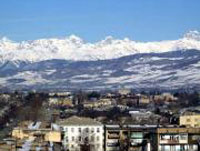South Ossetia: a week after the war
Since the beginning of the Georgian-South Ossetian war on August 7, many things have changed, both on political and battle field.

After one week of military interventions in Georgia and South Ossetia, many governments and organizations had placed enormous pressure on Russia to withdraw its forces from Georgia and restore peace in the region.
During the last week, Russia faced strong criticism for its actions from western democracies especially the United States. However, Russia describes its military intervention as a peacekeeping operation to protect its citizens and peacekeepers, and to enforce their peacekeeping mandate in South Ossetia. In relation, Russian President Dmitry Medvedev cited article 80 the Constitution of the Russian Federation, saying, "According to the Constitution, I must protect the life and dignity of Russian citizens wherever they are."
On August 12, Russia completed its operation to force Georgia to accept peace. As a reminder: Georgia launched a major ground and air offensive to seize control of the breakaway region of South Ossetia on August 8, forcing Russia to intervene and send in tanks and thousands of troops.
On August 16, Russian President Dmitry Medvedev signed the EU-brokered six-point peace plan. Plan was originally presented to President Medvedev by the French President Nicolas Sarkozy on August 12, however Moscow rejected it. Sarkozy's plan originally had only four points. Russia added the fifth and sixth points. Georgia asked for the additions in parentheses, but Russia rejected them. President Sarkozy eventually convinced Georgian President Mikheil Saakashvili to agree to the unchanged text.
The EU-brokered six-point peace plan contains the main principles to resolve the conflict in South Ossetia:
1. No recourse to the use of force.
2. Definitive cessation of hostilities.
3. Free access to humanitarian aid (addition rejected: and to allow the return of refugees).
4. Georgian military forces must withdraw to their normal bases of encampment.
5. Russian military forces must withdraw to the lines prior to the start of hostilities. While awaiting an international mechanism, Russian peacekeeping forces will implement additional security measures (addition rejected: six months).
6. Opening of international discussions on the modalities of lasting security in Abkhazia and South Ossetia (addition rejected: based on the decisions of the U.N. and the O.S.C.E.).
On August 17, Russian President Dmitry Medvedev said during a telephone conversation with his French counterpart Nicolas Sarkozy that Russian troops would start their pullout from Georgia on August 18. However, lawmaker Konstantin Kosachev, head of the Russian parliament's foreign affairs committee, said Moscow will withdraw only when it is "assured that Georgians will not continue to use military force" in the breakaway regions of South Ossetia and Abkhazia.
Since the beginning of the war, western democracies directed numerous demands to Russia to respect Georgia's territory, borders, national integrity and sovereignty.
These demands made Kosovo situation talked again. As a reminder, Kosovo was a breakaway region in the Republic of Serbia which declared independence in February 2008. In the next few days Kosovo was recognized as the Republic of Kosovo by many western democracies, including the United States.
Many times Russia asked Europe and the United States not to give Kosovo formal independence, and think about the whole situation. However, Russia's requests were ignored. Sergey Lavrov, the Russian Foreign Minister had warned the US Government and European diplomats that if they recognized Kosovo they would be setting a precedent for South Ossetia and other breakaway provinces around the world.
Now, just a few months after Kosovo's independence, South Ossetia is looking for the same treatment from the international community. The Ossetian majority in South Ossetia wants to secede from Georgia to become independent, or to join North Ossetia, just as a majority in Kosovo wanted to break away from Serbia to become independent, or to join Albania.
Countries that have recognized the independence of Kosovo are now looking for an argument that Kosovo is a "special case", and that Georgia territory has to be respected.
However, when one goes into the violation of the International Law and disregard sovereignty of one state (as it was done in the case of Kosovo), then same one can expect the possibility that such a recipe will be applied in other situations all over the world.
Ivan Simic
Belgrade, Serbia
Subscribe to Pravda.Ru Telegram channel, Facebook, RSS!


